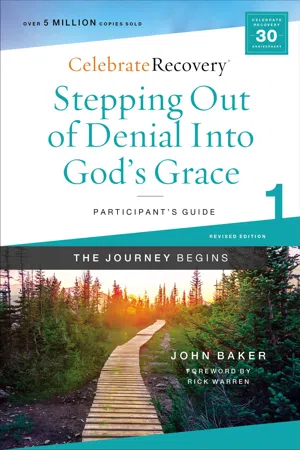
Stepping Out of Denial into God's Grace Participant's Guide 1
A Recovery Program Based on Eight Principles from the Beatitudes
- 64 pages
- English
- ePUB (mobile friendly)
- Available on iOS & Android
Stepping Out of Denial into God's Grace Participant's Guide 1
A Recovery Program Based on Eight Principles from the Beatitudes
About This Book
The Celebrate Recovery Participant's Guides are essential tools for the personal recovery journey. In the six lessons in Guide 1: Stepping Out of Denial Into God's Grace, you will experience the first 3 of the 8 recovery principles:
1 R ealize I'm not God. I admit that I am powerless to control my tendency to do the wrong thing and that my life is unmanageable. "Happy are those who know they are spiritually poor" (Matthew 5: 3).
2 E arnestly believe that God exists, that I matter to him, and that he has the power to help me recover. "Happy are those who mourn, for they shall be comforted" (Matthew 5: 4).
3 C onsciously choose to commit all my life and will to Christ's care and control. "Happy are the meek" (Matthew 5: 5).
By working through the lessons and exercises found in each of the four Participant's Guides you will begin to experience the true peace and serenity you have been seeking, restore and develop stronger relationships with others and with God, and find freedom from life's hurts, hang-ups, and habits. All the scriptures have been updated to the new NIV 2011 version.
Frequently asked questions
Information
Lesson 1
DENIAL

Principle 1: Realize I’m not God. I admit that I am powerless to control my tendency to do the wrong thing and that my life is unmanageable.“Happy are those who know they are spiritually poor.” (Matthew 5:3)
Step 1: We admitted we were powerless over our addictions and compulsive behaviors, that our lives had become unmanageable.“For I know that good itself does not dwell in me, that is, in my sinful nature. For I have the desire to do what is good, but I cannot carry it out.” (Romans 7:18)

Think About It
Disables our feelings
Energy lost
Negates growth
Isolates us from God
Alienates us from our relationships
Lengthens the pain

Write About It
Lesson 2
POWERLESS

Principle 1: Realize I’m not God. I admit that I am powerless to control my tendency to do the wrong thing and that my life is unmanageable.”“Happy are those who know they are spiritually poor.” (Matthew 5:3)
Step 1: We admitted we were powerless over our addictions and compulsive behaviors, that our lives had become unmanageable.“For I know that good itself does not dwell in me, that is, in my sinful nature. For I have the desire to do what is good, but I cannot carry it out.” (Romans 7:18)

Think About It
Table of contents
- Cover Page
- Title Page
- Copyright Page
- Ebook Instructions
- Contents
- Foreword By Rick Warren
- Introduction
- The Road to Recovery: Eight Principles Based On the Beatitudes
- Twelve Steps and Their Biblical Comparisons
- Serenity Prayer
- Celebrate Recovery’s Small Group Guidelines
- Lesson 1: Denial
- Lesson 2: Powerless
- Lesson 3: Hope
- Lesson 4: Sanity
- Lesson 5: Turn
- Lesson 6: Action
- Afterword